- Home
- Keri Arthur
Unlit_A Kingdoms of Earth & Air Novel
Unlit_A Kingdoms of Earth & Air Novel Read online
Unlit
A Kingdoms of Earth & Air Novel
Keri Arthur
KA Publishing PTY LTD
Copyright © 2018 by Keri Arthur
All rights reserved.
No part of this book may be reproduced in any form or by any electronic or mechanical means, including information storage and retrieval systems, without written permission from the author, except for the use of brief quotations in a book review.
All characters and events in this book are fictitious. Any resemblance to real people, alive or dead, is entirely coincidental.
ISBN: 978-0-6480077-8-4
Created with Vellum
With thanks to:
The Lulus
Indigo Chick Designs
Hot Tree Editing
Robyn E.
The lovely ladies from Central Vic Writers
Damonza for the amazing cover.
Contents
Chapter 1
Chapter 2
Chapter 3
Chapter 4
Chapter 5
Chapter 6
Chapter 7
Chapter 8
Chapter 9
Chapter 10
Chapter 11
Chapter 12
Chapter 13
Chapter 14
About the Author
Also by Keri Arthur
1
In the still crispness of a dawn not yet risen, evil stirred. It was a whisper, a promise that rode the breeze like an Irkallan ghost, insubstantial and yet threatening.
I leaned over the parapet, one gloved hand gripping the glass-smooth edge of the nearest merlon to ensure I didn’t fall. Watchtower eight was situated at the very end of Winterborne’s massive metal curtain wall. To my left lay nothing but a two-hundred-foot drop to the dark waters of Hook’s Bay, an area that had once supported a vast fishing fleet, but was now as barren and as empty as the lands beyond this wall. Tenterra, like the bay itself, had been drained of life five hundred years ago when Winterborne’s witches had joined forces and—in a last, desperate effort to save the gateway city and stop the Irkallan from entering Gallion—had drawn every ounce of energy from earth and air and cast it against it our foe. The ploy had certainly worked, but the price we’d paid for salvation was high. The once fertile farmlands of Tenterra were now little more than a two-hundred-and-fifty-mile-wide bowl of dust and broken riverbeds, and the skies above us had become volatile and unpredictable. Much of Winterborne itself had fallen into the seas; the sections that had survived were perched on a mountainous strip of land barely two miles wide and ten miles long.
The breeze strengthened as I leaned farther away from the wall, her chill fingers rifling through my short hair and chilling my scalp. I should have been wearing my helmet, but the close fit of the damn thing always felt suffocating. Besides, it wouldn’t exactly save my life if I fell. Not from this height.
I couldn’t see anything out there in the darkness. There was no sign of movement, nor should there have been given dawn’s first fanfare was still a good twenty minutes away.
My gaze rose to the distant, craggy line that rather resembled a drakkon arching its back. It was the Blacksaw Mountains, and the home of the Irkallan. But if they were finally stirring from hibernation, we surely would have gotten word from one of the outposts that guarded both the Adlin and Irkallan borders.
No, whatever this evil was, it was closer than those mountains.
I flared my nostrils and drew in a deeper breath. The wind might share some of her many secrets with me, but it seemed she wasn’t willing to reveal the source of that evil. Maybe she didn’t know. Or maybe she merely teased. I shouldn’t, after all, have even been able to understand her, let alone have any ability—however slight—to summon her.
Not that the wind or the earth actually whispered; it was instead the souls of all those who’d once controlled those elements. It’s said that on death, earth and air witches were not reincarnated but rather joined the collective consciousness of their element, offering their wisdom, their opinions, and sometimes even their remonstrations to the next generation of those born with the ability to hear and control.
Which should not have been me. I was one of the unlit, a child born without magic in a world that revered it. The only thing that had saved me from a life of serfdom was the fact that I came from a Sifft bloodline—an ancient human race that could take on wildcat form at will. Thanks to centuries of DNA dilution, it was very rare these days to find anyone who could actually shift, but many of us did at least get some, if not all, of their other capabilities—greater strength, the ability to heal at a very fast rate, extraordinary night vision, and some degree of telepathy, though few could read minds without some form of enhancement device. I might have been raised in government care like every other child deemed to be unlit, but I’d also been trained from a very young age in weapon use and survival fighting, simply because of that Sifft heritage. When I’d come of age and the strength of my night vision had been confirmed, I’d been transferred over to the Nightwatch for more intensive training. I’d become a fully-fledged member at eighteen, and had been stationed on this tower for almost half that time again; this place—this area—was as familiar to me as the staining on my body.
Whatever I was sensing, it wasn’t originating from anywhere around here.
I activated the earwig, a long-range communications device that used a mix of magic and technology to allow mind-to-mind communication and drew on body heat as an energy source. They hooked around the ear and had a pliable tail that slipped into the auditory canal. With it, we could converse with other Nightwatch officers and the communicators—true telepaths who monitored both short- and long-distance comms via a multi-enhancement chip inserted into their skulls, one that had the unfortunate side effect of slowly frying their brains. But communicators, like everyone else who was deemed unlit, had very little choice when it came to their career path.
“Ava,” I said, “have you spotted any sort of movement at your end?”
“That,” came the low and sultry reply, “would depend on which end you’re talking about. It’s been a long night, after all, and bathroom facilities are decidedly scarce on these towers.”
I smiled. Ava and I had been born in the same month, and therefore not only shared a surname, but had been raised together, trained together, and had even explored the boundaries of our sexuality together. She was my cot sister, my friend, and the one person in this world I would do anything for—the one person in this world who would, without doubt, do anything for me.
“I definitely wasn’t referring to your bowel problems.”
“Huh.” She paused. “There’s nothing moving in either the gateway area or the vicinity immediately beyond it. Why?”
“Not sure.”
While Ava was well aware of my ability to sometimes hear the wind’s chatter, this line wasn’t secure and I had no wish for anyone else to learn about it. I liked being a part of the Nightwatch and the last thing I wanted was to be shunted into a position designed specifically for those with minor magic talents. From what I’d seen, such a life wasn’t all that great. Indeed, given the desire to produce magic-capable children, those who held minor magic were treated little better than bovines, kept confined and pregnant year in and year out, with no say in who they were bred to.
At least as a soldier I had more status and certainly more freedom—although none of the unlit could roam the entire city at will. The Upper and Lower Reaches—where those belonging to the ruling houses of earth and air lived, as well as those capable of personal magic, and the serfs and freemen who looked after them all—were out-of-bounds to the re
st of us.
“That’s not exactly helpful,” Ava commented.
“I know.” I pulled back from the edge, but as I did, a white light flashed in the distance—a small star-like speck that swiftly disappeared. It had that part of me that could hear the wind stirring excitedly. “Did you see that?”
“Clarify ‘that.’”
“There was a flash of light to the northwest.” The light sparked again. “Surely you saw it that time?”
“I did.” She paused. “If I had to guess what it was, I’d say a beacon of some sort. Cap, you picking anything up?”
“There’s no beacon out that way, and no incoming due from either the Blacklake or West Range encampments.”
The captain’s voice was little more than a harsh whisper. He’d lost an arm and almost his life when a sleuth of Adlin—who were eight-foot-tall hairy humanoid creatures with razor-sharp teeth and claws to match—had attacked the train he and six other Nightwatch officers were escorting to Winterborne from the Eastridge outpost. He now had a mechanical arm, but neither the surgeons nor the healers who’d saved his life had been able to do much for the vocal chords that had all but been destroyed when his throat had been ripped open. How any of them had survived let alone made it back to Winterborne was already the stuff of legends.
“Could it be an Adlin beacon?” They were certainly capable of rudimentary assault weapons and, in the last few months, we’d seen some evidence they were using glimmer stones—a black rock that drew in light and shone like a star at night—as a basic signaling device.
“None of the beacons we’ve found to date have had the capacity to be seen from such a distance,” the captain replied. “Whatever it is, I doubt it’s Adlin.”
“Well, there’s definitely something out there, Cap, whether it’s Adlin or not,” I said as the light flashed again. “It’s too regular to be a random.”
“Anyone else spotting it?” he asked.
Affirmatives ran down the line. There were ten watchtowers in all—eight along the curtain wall’s curvaceous length and an additional two guarding the front of the gatehouse. All of them were occupied by Nightwatch officers who were as close to full Sifft as anyone got these days.
Not that any of us really knew our true heritage. All who were declared unlit were taken away within hours of being born. We were told nothing of our lineage, and given no idea whether we were commonly born or from one of the witch houses. Our birth month always became our surname, but our first names were selected by whoever accepted us into government care. As names went, Neve March wasn’t bad; some of my fellow Nightwatch officers had not been so lucky. Poor April had certainly been the butt of many a good-natured joke, not only because April was also his birth month, but because it was a name more suited to a female.
“There’s nothing reading on the radar,” someone else said. It was obviously one of the newer recruits, because I didn’t recognize the voice.
The captain grunted. “Neve, looks like this is your baby. Requisition a scooter and go check it out.”
I groaned. “Come on, Cap, I clock off in twenty minutes.”
“You know the drill,” he growled back. “You spot it, you deal with it.”
“Can I least have some support?”
“No. The Adlin haven’t been active in Tenterra for over a month, so there shouldn’t be a problem.” He hesitated. “I’ll approve use of a rifle, however. Report to armory three.”
Relief stirred. The blaster strapped to my right leg might be capable of bringing down the average person, but the Adlin were as far from average as you could get. But access to more powerful weapons had been restricted of late, and generally reserved for escort details rather than mere scouting missions. According to rumors, metal supply from the smiths of Salysis had been severely curtailed thanks to a recent collapse in one of their major mines. “Appreciate it, Cap.”
He grunted again. “I’ll send Lort over to finish your shift. Get your ass into gear.”
“On my way.”
“Keep vigilant out there, Neve,” Ava said. “Don’t get dead.”
“I suspect dead is not a look that would suit me.”
“I suspect you could be right.”
Grinning, I pulled off my right glove and pressed my hand against the reader. Once my fingertips were scanned, the light above the blast door flicked from red to green and the door slid open. I grabbed my helmet then clattered down the metal stairs, my footsteps echoing forlornly across the night. Some of the guards hated the solitude that came with being one of the Nightwatch, but I loved it—especially after twenty-eight years of being forced to share space in every other aspect of my life. There was no such thing as privacy for the unlit—not since half the city had fallen into the sea, anyway. Space was at such a premium here in what was known as the outer bailey—although Winterborne itself was a major city rather than any sort of castle—that there were now six of us sharing one tiny bunkhouse room and a bathroom. The only reason no one had come to blows was thanks to the fact Ava not only looked like a goddess, she had the persuasion powers of one, too.
Armory three was situated midway between my tower and the secondary wall, and was tucked underneath a huge claw of black rock that protected it from any possibility of attack from the sea. Jon May, the grizzled veteran who’d been in charge of this armory for as long as I could remember, pushed up from his seat and hobbled over to the scanner as I approached.
“Everett told me you were coming,” he said. “I’m to supply you with a nitrate rifle and a couple of gut busters.”
A gut buster was the nickname for a very serious handgun that fired multiple metal pellets in one round, and could literally tear anyone or anything other than an Adlin warrior apart. Which was where the rifle came in—silver nitrate bullets were basically the only things capable of stopping them in their tracks. And if the captain had ordered me supplied with both, then he obviously hadn’t been entirely honest about the lack of recent attacks.
“Here’s hoping I don’t actually need any of them.”
Jon’s smile flashed, revealing stained teeth. “Amen to that, sister.”
I followed him into the armory’s shadowed confines. While most of the larger weapons such as the canons were stored deep underground, and were accessible only by special lifts that hoisted them into position whenever needed, there were three other armories like this strategically placed around the Lower Reaches, and four more behind the secondary wall—a wall that still bore the wounds of a war long gone.
This armory was the only one left that predated that war, however, and it was something of a museum when it came to weaponry. There were even swords hanging in the deeper recesses, though why anyone would resort to such a weapon in the face a foe like the Adlin or the Irkallan, I had no idea. Our ancestors were either a whole lot braver than we were, or decidedly more foolish.
An odd glimmer caught my attention and, as Jon stopped in front of the locker holding the nitrate rifles, I walked across to investigate.
The glimmer was coming from a knife—one that had an intricately carved handle and a short but decidedly dangerous-looking blue-white glass blade. It looked ceremonial but the dark flecks along its edge suggested use.
“Jon, where did this blade come from?”
He glanced over his shoulder and grunted. “Don’t know, love, but it’s been here longer than I have.”
“Any problem with me picking it up?”
“None at all.” He pulled free a rifle, then unlocked the next unit and gathered ammunition.
I plucked the knife from its bed of dust. It felt light and well-balanced in my hand—a knife designed for throwing as much as close-quarter combat.
“Why would anyone use glass for a knife blade?” I carefully ran a finger down its edge, and it sliced through the top layer of my glove easily. Still razor-sharp, even after decades of disuse.
“It’s some form of specially hardened glass,” he replied. “I’ve got a couple of swords in the
back made of the same stuff. Tougher than steel, they are, and all but indestructible. Legend has it that they’re called ghost blades, and were forged in the blood of the Irkallan.”
“Huh.” I shifted the blade from my right hand to my left and slashed it back and forth. It felt oddly right, almost as if it had been designed specifically for someone my size. “If the material is so damn good, how come we’re not using it today?”
He shrugged. “Lost the method of creating it, most likely.”
I glanced at the shelf again and spotted a leather strap sitting at the very back. I rose on tiptoes and grabbed it. It turned out to be a knife sheath made from an unusual lavender-gray leather and, like the knife itself, was intricately carved, the swirling patterns almost resembling drakkon scales. Weirdly, despite the fact it must have been in this room for as long as the blade, the leather was still soft, still supple.
“What are the chances of me requisitioning it?” I slipped the knife into its sheath then strapped it to my left leg. I couldn’t even feel its weight.
Jon glanced at me, surprise evident. “A knife isn’t going to be of much use in an Adlin attack. If you’re close enough to use that thing, you’re dead.”
“I know, but other critters do roam Tenterra.” Or, at least, roamed her borders.
“And that’s what you have blasters for.”
I grinned. “Yes, but sometimes ammo does run out.”
His expression suggested I was crazy, but all he said was “It’s been delisted as an active weapon, so as long as you sign for it, it’s yours. Come along.”
I followed him over to the small office area, signed out the weapons and the ammo, then thanked him and headed across to the motor pool to grab a scooter.

 Kissing Sin
Kissing Sin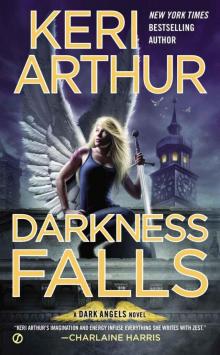 Darkness Falls
Darkness Falls Hell's Bell
Hell's Bell Moon Sworn
Moon Sworn Beneath a Rising Moon
Beneath a Rising Moon The Darkest Kiss
The Darkest Kiss Dancing with the Devil
Dancing with the Devil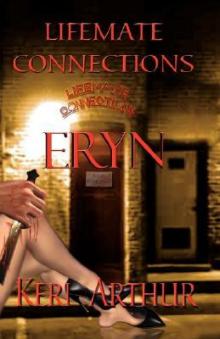 Lifemate Connections: Eryn
Lifemate Connections: Eryn The Black Tide
The Black Tide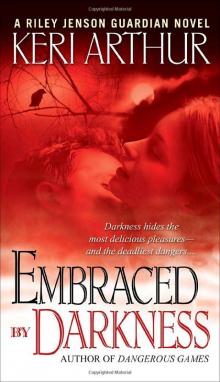 Embraced By Darkness
Embraced By Darkness Deadly Desire
Deadly Desire Tempting Evil
Tempting Evil Kiss The Night Goodbye
Kiss The Night Goodbye Bound to Shadows
Bound to Shadows Circle of Desire
Circle of Desire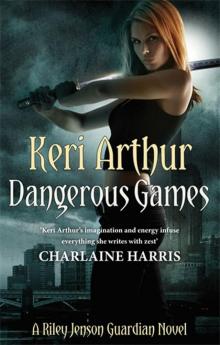 Dangerous Games
Dangerous Games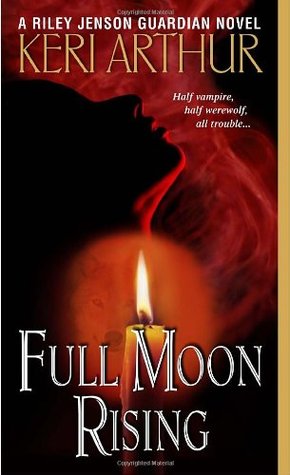 Full Moon Rising
Full Moon Rising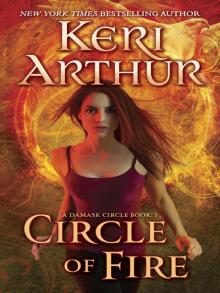 Circle of Fire
Circle of Fire Darkness Rising
Darkness Rising Deadly Vows
Deadly Vows Darkness Devours
Darkness Devours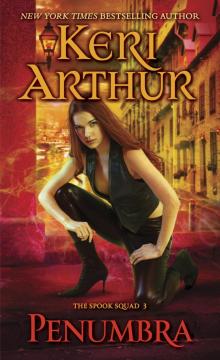 Penumbra
Penumbra Who Needs Enemies
Who Needs Enemies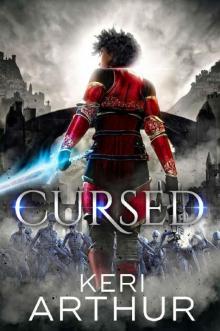 Cursed (Kingdoms of Earth & Air Book 2)
Cursed (Kingdoms of Earth & Air Book 2) Hearts in Darkness
Hearts in Darkness Darkness Hunts
Darkness Hunts Wicked Wings (The Lizzie Grace Series Book 5)
Wicked Wings (The Lizzie Grace Series Book 5) Circle of Death
Circle of Death Chasing the Shadows
Chasing the Shadows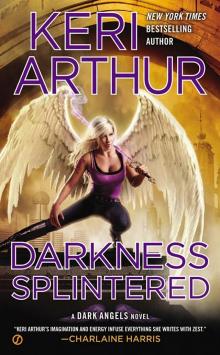 Darkness Splintered
Darkness Splintered Ashes Reborn
Ashes Reborn Demon's Dance
Demon's Dance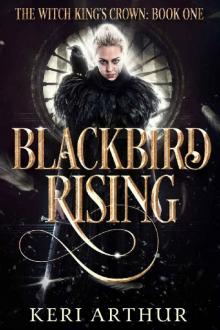 Blackbird Rising (The Witch King's Crown Book 1)
Blackbird Rising (The Witch King's Crown Book 1)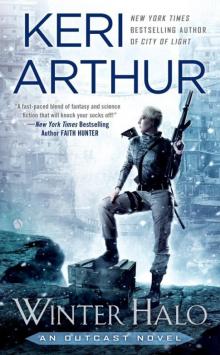 Winter Halo
Winter Halo Wicked Wings
Wicked Wings Kiss the Night Good-bye
Kiss the Night Good-bye Destiny Kills
Destiny Kills Mercy Burns
Mercy Burns Beneath a Darkening Moon
Beneath a Darkening Moon Demon's Dance (The Lizzie Grace Series Book 4)
Demon's Dance (The Lizzie Grace Series Book 4) Burn
Burn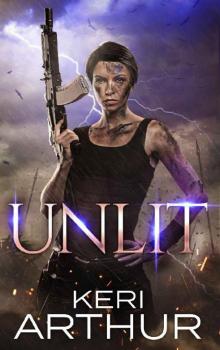 Unlit_A Kingdoms of Earth & Air Novel
Unlit_A Kingdoms of Earth & Air Novel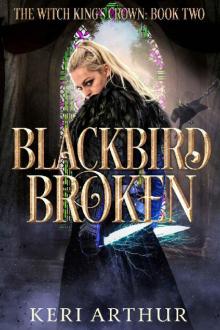 Blackbird Broken (The Witch King's Crown Book 2)
Blackbird Broken (The Witch King's Crown Book 2)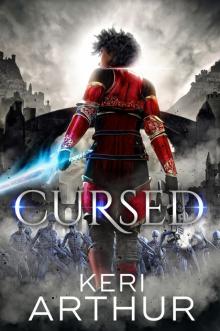 Cursed
Cursed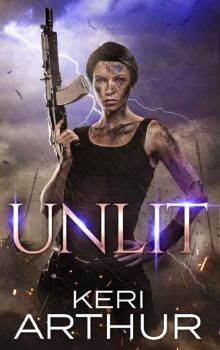 Unlit
Unlit